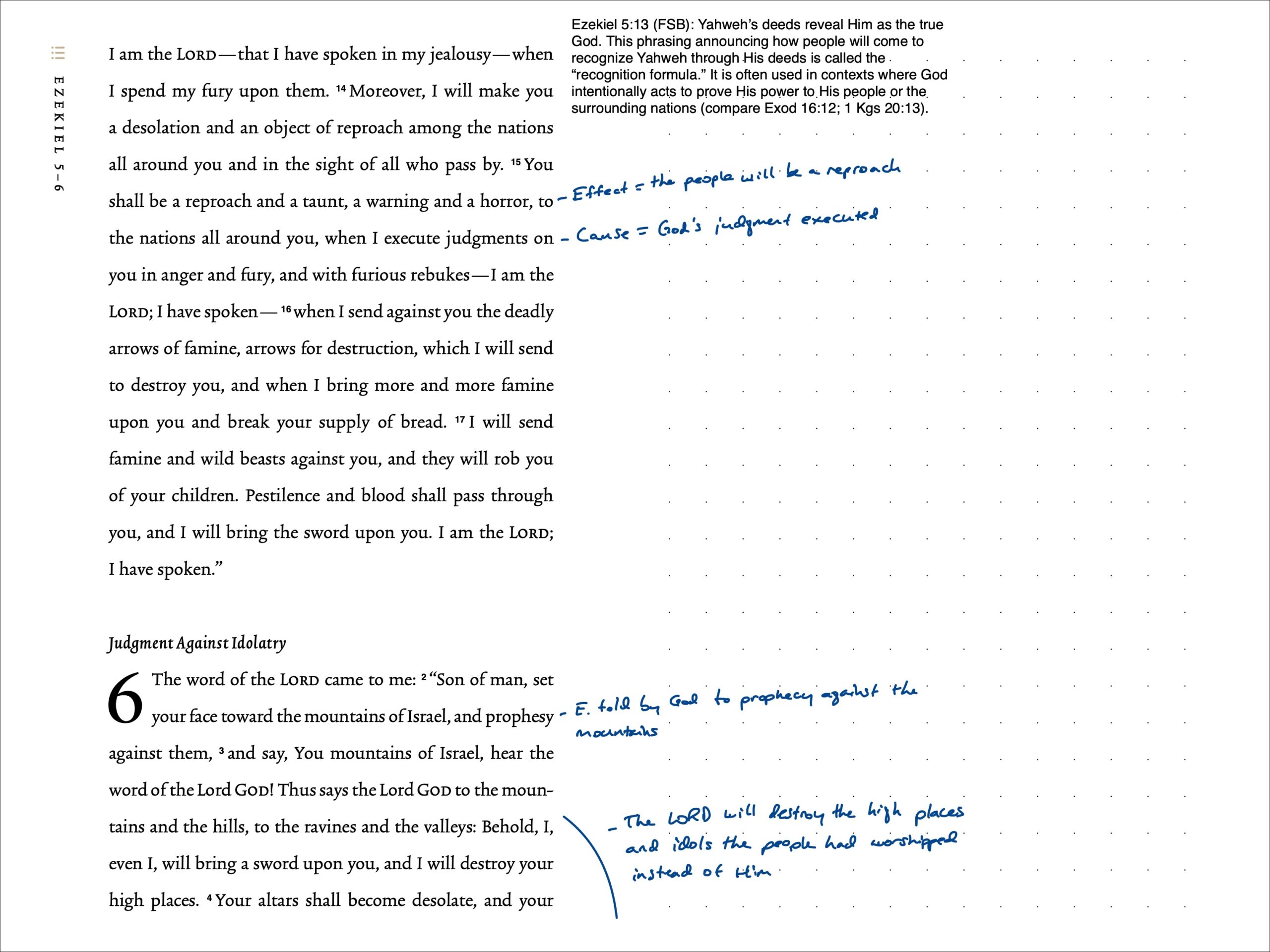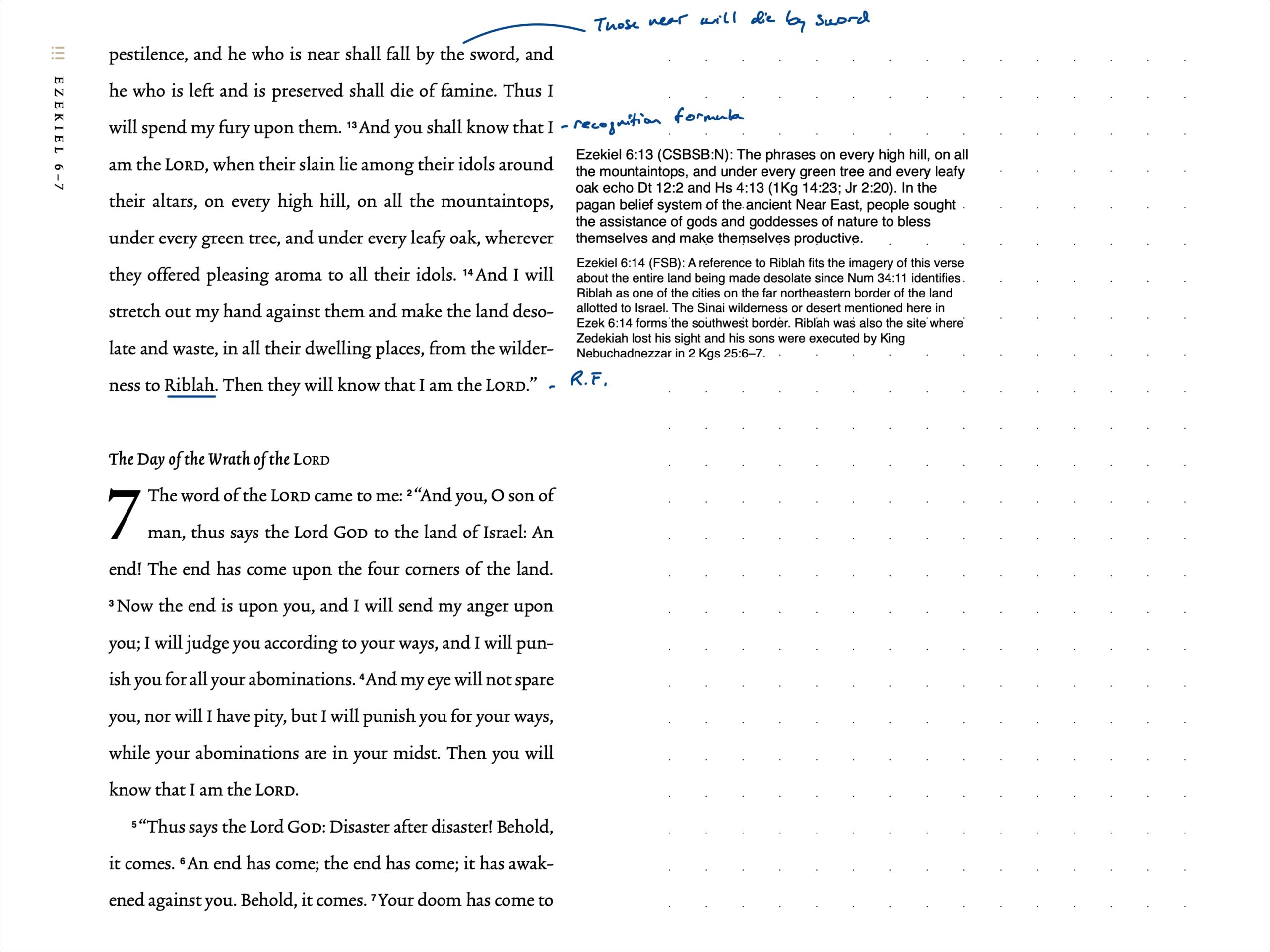| Date | Version | Reading Plan |
|---|---|---|
| @August 26, 2023 | ESV (2016) | ESV Prophets Plan 2023 |
Pericopes
- Judgment Against Idolatry
Notes
The chapter opens with God telling Ezekiel to set his face “toward the mountains of Israel, and prophecy against them”. The prophecy is against the mountains but the indictment is directed at the people who created mountain shrines for idol worship. The mountains are warned of the judgment coming to the altars and shrines they had built upon them.
In Ezek. 6:3-7, God declares that He will destroy the high places and idols the people had worshiped instead of Him. God will lay the dead bodies of the people in front of their idolatrous altars and scatter their bones around them (Ezek. 6:5). The presence of dead bodies and bones would have defiled the high places and made them unfit for further religious activity. The section closes with the “recognition formula”, that God’s motive of destruction was to bring the people to understand that He is the One, true LORD worthy of worship (Ezek. 6:7).
Ezek. 6:8-10 describes the remnant that God will leave among the people. Those who escape will remember the LORD and how He was “broken over their whoring heart that has departed” from Him and gone after idols. The people will become loathsome of themselves for the evils they had committed against Him. This section again concludes with the recognition formula and that God was not vain in His intention to do this evil to them (Ezek. 6:10)
In the remaining verses (Ezek. 6:11-14), Ezekiel is told to clap his hands and stamp his feet because of all the abominations of the house of Israel (Ezek. 6:11). This was a command to sing a number of taunt songs against Israel’s enemies (see Ezek. 27; Ezek. 28; Ezek. 31; Ezek. 32). The people will fall by the sword, famine and pestilence; those far off by pestilence, those near by the sword and those preserved by famine. The slain will lie among their idols “on every high hill, on all the mountaintops, under every green tree, and under every leafy oak”. (Ezek. 6:13). These references echo Deut. 12:3 and Hosea 4:13. In the pagan belief system of the ancient Near East, people sought the assistance of gods and goddesses of nature to be blessed and more productive. This section again concludes with the recognition formula.
Application
In this chapter we see God’s disdain for idolatry but also His mercy to not make a full end of the people. They were worshiping things that could not profit or deliver and God was gracious to take needed action that would bring a remnant to repentance and self-loathing for their own idolatrous practices.
It is grace in action when God instills a hatred for one’s sin by giving him a desire for His righteousness. In our default fallen nature, we are children of wrath, drawn to sin. Worthy of all praise is our God who reveals to us the destructive end of our fleshly desires. He does this not of anything redemptive within ourselves, but solely from the overflow of His mercy. Moreover, Jesus went beyond merely showing us sin’s futility. He permanently eradicated its effect, death, by becoming sin and death Himself, bringing us to new life in Him and restoring right relationship with the Father. “For our sake he made him to be sin who knew no sin, so that in him we might become the righteousness of God.” (2 Cor. 5:21)
Scripture Journal Notes
Commentaries & Resources Used
- ESV Study Bible. (Wheaton, IL: Crossway, 2008)
- Faithlife Study Bible (Lexham Press, 2016)
- Believer’s Bible Commentary (Thomas Nelson, 2016)
- CSB Study Bible Notes (Holman Bible Publishers, 2017)
- Matthew Henry’s Commentary on the Whole Bible (Guardian Press, 1976)
- The Bible: A Reader’s Guide (Sterling Publishing, 2011)
- The Infographic Bible (Zondervan, 2018)
- ESV Digital Scripture Journal (Crossway, 2019)


